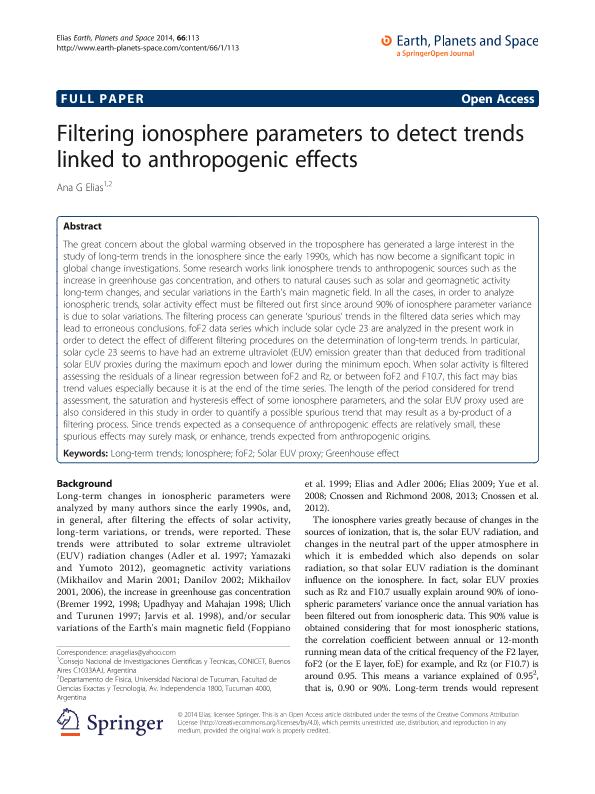Artículo
Filtering ionosphere parameters to detect trends linked to anthropogenic effects
Fecha de publicación:
09/2014
Editorial:
Springer
Revista:
Earth, Planets and Space
ISSN:
1880-5981
Idioma:
Inglés
Tipo de recurso:
Artículo publicado
Clasificación temática:
Resumen
The great concern about the global warming observed in the troposphere has generated a large interest in the study of long-term trends in the ionosphere since the early 1990s, which has now become a significant topic in global change investigations. Some research works link ionosphere trends to anthropogenic sources such as the increase in greenhouse gas concentration, and others to natural causes such as solar and geomagnetic activity long-term changes, and secular variations in the Earth´s main magnetic field. In all the cases, in order to analyze ionospheric trends, solar activity effect must be filtered out first since around 90% of ionosphere parameter variance is due to solar variations. The filtering process can generate ?spurious? trends in the filtered data series which may lead to erroneous conclusions. foF2 data series which include solar cycle 23 are analyzed in the present work in order to detect the effect of different filtering procedures on the determination of long-term trends. In particular, solar cycle 23 seems to have had an extreme ultraviolet (EUV) emission greater than that deduced from traditional solar EUV proxies during the maximum epoch and lower during the minimum epoch. When solar activity is filtered assessing the residuals of a linear regression between foF2 and Rz, or between foF2 and F10.7, this fact may bias trend values especially because it is at the end of the time series. The length of the period considered for trend assessment, the saturation and hysteresis effect of some ionosphere parameters, and the solar EUV proxy used are also considered in this study in order to quantify a possible spurious trend that may result as a by-product of a filtering process. Since trends expected as a consequence of anthropogenic effects are relatively small, these spurious effects may surely mask, or enhance, trends expected from anthropogenic origins.
Palabras clave:
Long-Term Trends
,
Ionosphere
,
Solar Euv Proxy
,
Greenhouse Effect
Archivos asociados
Licencia
Identificadores
Colecciones
Articulos(CCT - NOA SUR)
Articulos de CTRO.CIENTIFICO TECNOL.CONICET - NOA SUR
Articulos de CTRO.CIENTIFICO TECNOL.CONICET - NOA SUR
Citación
Elias, Ana Georgina; Filtering ionosphere parameters to detect trends linked to anthropogenic effects; Springer; Earth, Planets and Space; 66; 9-2014; 113-123
Compartir
Altmétricas




